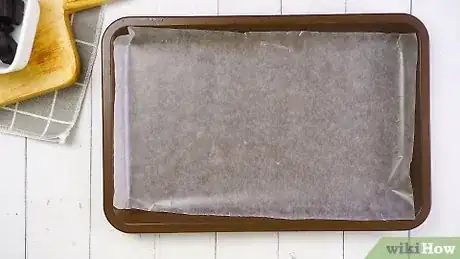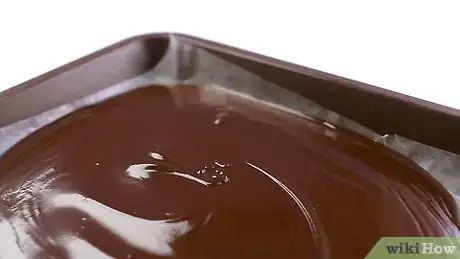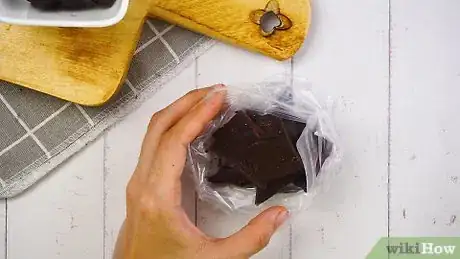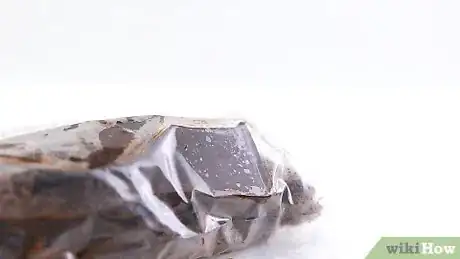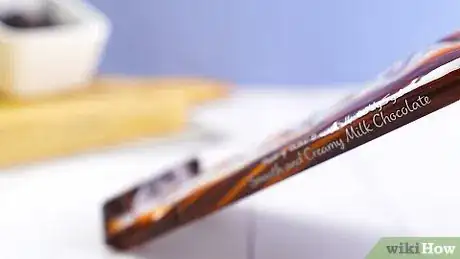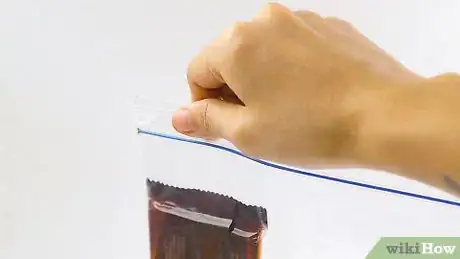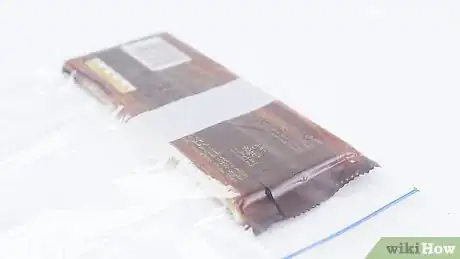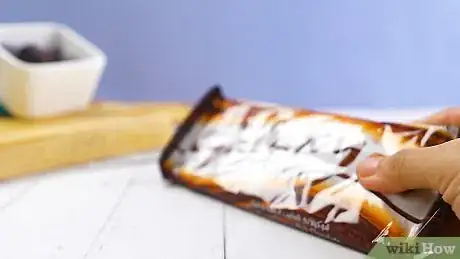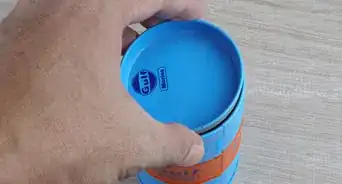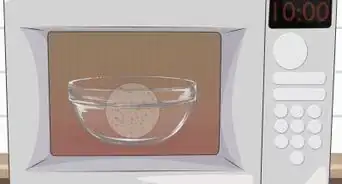This article was co-authored by wikiHow Staff. Our trained team of editors and researchers validate articles for accuracy and comprehensiveness. wikiHow's Content Management Team carefully monitors the work from our editorial staff to ensure that each article is backed by trusted research and meets our high quality standards.
There are 13 references cited in this article, which can be found at the bottom of the page.
The wikiHow Video Team also followed the article's instructions and verified that they work.
This article has been viewed 36,097 times.
Learn more...
You put in the work, melted down a block of chocolate, and made something delicious. If you have a lot left after rewarding yourself with a sample, you can save it for your next recipe. Melted chocolate is pretty easy to freeze, but it’s best when it’s done gradually. Chocolate candy can also be frozen to preserve it for longer. When you’re ready to enjoy the chocolate, just take it out of the freezer to defrost. You can then melt chocolate again or enjoy frozen candy for a sweet treat.
Steps
Storing Baking Chocolate
-
1Cover a baking sheet with parchment paper. First, select a baking sheet that is large enough to hold all of the chocolate you’re freezing. If you have a lot, plan on dividing the chocolate up between a few different sheets. Then, lay a piece of parchment paper down, spreading it out so it’s flat against the sheet. Cover the entire sheet so the chocolate can’t stick to it.[1]
- The chocolate freezes faster when it’s spread out into several thin layers rather than poured into a single, deep pan.
- If the chocolate comes into contact with the baking sheet, it will be tough to remove later.
-
2Pour the chocolate onto the baking sheet. Hold the bowl above the center of the baking sheet, then tip it over. You don’t have to move it at all, since the chocolate will spread out on its own. Keep it about 1⁄2 in (1.3 cm) thick so it solidifies at a quick, consistent rate.[2]
- Try to avoid letting the chocolate touch the sides of the baking sheet. It could get stuck and become difficult to remove without snapping it into a bunch of tiny chocolate shards.
- If you’re unable to get the chocolate out of the bowl, try setting it in a little bit of hot water or placing it on a heating pad. When the chocolate softens, scrape it out with a spatula.[3]
Advertisement -
3Put the chocolate into the refrigerator for about 20 minutes to cool gradually. Place the baking sheet on one of the shelves in your refrigerator. Check back on it about every 10 minutes. It won’t take too long to solidify, and, once it has set, you can begin freezing it. Make sure it’s solid all the way through before taking it out.[4]
- If you’re planning on storing chocolate long-term, it has to be cooled first before it can be frozen. Doing it gradually helps preserve its original taste and texture better.
- You may see some white spots form on the chocolate. It’s called chocolate bloom and happens when fat and sugar separate. It’s normal and goes away when you melt the chocolate again.
- Try to avoid leaving the chocolate in the refrigerator too long. It tends to absorb odors and its flavor can start to dull.
-
4Cut the hardened chocolate up into small pieces for storage. You can leave the chocolate on the parchment paper. Use a sharp chef’s knife to chop it up into pieces 1 in (2.5 cm) long or smaller. When you need to use the chocolate next, you can grab what you want instead of waiting for all of it to defrost.[5]
- If you only have a little bit of chocolate to freeze, you could place it directly into a freezer bag. It will be brittle, so you could snap it by hand to break it down further.
-
5Move the chocolate into a resealable, freezer-safe container. For instance, stuff it into a plastic freezer bag labeled with today’s date. Place the chocolate at the bottom of the bag, then press down on the empty portion to push as much air out as you can.[6]
- Make sure the container is sealed so that moisture doesn’t get into it. Moisture causes spots to form on the chocolate.
- If you have a vacuum sealer, use it to keep chocolate fresh for longer. When you put chocolate in a vacuum bag and pass it through the sealer, it sucks all the air out.
-
6Store the chocolate in the freezer for up to 2 years. Keep it in a spot where the bag or container won’t be damaged. As long as it stays sealed, it will stay fresh for a while. To get the best possible quality out of it, use it as soon as you can. When you’re ready to use it, move it into the refrigerator to defrost.[7]
- You may see some white spots form on the chocolate, but it’s still safe to eat. If you melt it and stir it, the crystalized cocoa fat and sugar gets mixed back together.
- Although chocolate lasts for a while, it’s best when it’s fresh. Anything in your freezer long-term eventually loses its flavor.
Preserving Melting Candy
-
1Keep the chocolate in its original packaging, if possible. Taking it out of the packaging leaves you with a mess that is difficult to wrestle into a freezer-safe container. You can save yourself a lot of the hassle by just tossing the packaged chocolate into a freezer bag. Wrapped bars, bags of chocolate chips, and even boxes of chocolate candy all fit into large freezer bags.[8]
- If you don’t have a freezer-safe container big enough to hold the entire package, then scrape the chocolate onto a baking sheet lined with parchment paper and stick it in the refrigerator until it solidifies.
- Freezing is really useful if you live in a warm climate or know that your kitchen never cools down. Otherwise, it will be fine in a dark cupboard or even in the refrigerator.
-
2Secure the chocolate in a freezer bag or another protective container. Stuff the chocolate down toward the bottom of the bag, then press the empty part flat to push out air. Seal the bag and label it with today’s date. If the chocolate is already covered in plastic, you could wrap it up tightly in plastic wrap instead.[9]
- No matter what kind of storage container you use, make sure it’s well-sealed. Chocolate absorbs other scents. Refrigerators and freezers have many odors that could change how the chocolate tastes.
-
3Store the chocolate in a refrigerator for up to 24 hours to cool gradually. Leave it in the refrigerator long enough to harden. Make sure the entire piece of chocolate feels consistently solid. It may be a little brittle, so handle it with caution.[10]
- If you move the chocolate into the freezer too quickly, it “sweats.” It’s not quite as gross as it sounds, but it means that moisture has settled on the chocolate. It causes the chocolate to be sticky.
-
4Move the chocolate into the freezer to store it long-term. Find a safe spot where the chocolate won’t be exposed to moisture. If you covered it in plastic, for instance, make sure it stays sealed. Keep it away from anything with sharp corners that could poke through the wrap.[11]
-
5Freeze the chocolate for up to 2 years. It stays fresh for a while, but it also depends on what kind of chocolate you’re storing. In general, high-end chocolate doesn’t last as long as candy bars and baking chocolate. Homemade, handmade, and gourmet chocolate is best when enjoyed within 6 months.[12]
- Chocolate doesn’t really go bad, but it loses its flavor after a while. It also tends to lose its texture once it’s frozen, so it might not taste exactly the same as it did before.
- If you see white spots on the chocolate, it isn’t from mold. It’s from fat and sugar rising to the top. Your chocolate will still be safe to eat.
Thawing Frozen Chocolate
-
1Place frozen chocolate ahead of time to defrost gradually. Keep it in the same container you used to store it in the freezer. Be sure to plan ahead so you are able to give it enough time to thaw out. If you are able to let it warm up slowly, it will look and taste better.[13]
- If you leave frozen chocolate out at room temperature, it will sweat. The extra moisture changes its shape and texture so it doesn’t taste quite as good as it should.
-
2Wait up to 24 hours for the chocolate to thaw out. The more time you’re able to spare, the better. In general, chocolate won’t require an entire day to thaw. If you’re planning on using the chocolate sooner rather than later, check it on occasion. If it’s solid all over but not frozen, then you can eat it or cook with it right away.[14]
- Most chocolate thaws out within 4 to 12 hours, but it depends on how big the piece is. A small candy bar or bag of chocolate chips won’t take too long, but a big container of baking chocolate might take closer to 24 hours.
- Defrosted chocolate is usually good for melting and baking but not dipping. Freezing causes it to crystallize and not stick very well to other food.
-
3Freeze leftover chocolate again by storing it in a sealed container. Chocolate can be thawed out and refrozen multiple times. It won’t change very much in most cases. Just put it back into a resealable freezer bag or container. When you’re ready to use it next time, put it in your refrigerator to thaw again.[15]
- Refrozen chocolate still lasts for up to 2 years. Keep in mind that the chocolate may change a little each time you heat or cool it, so try to only defrost what you need.
Warnings
- Freezing chocolate can slightly change the way it looks and tastes. To limit white spots from forming, warm and cool chocolate slowly and keep it sealed when freezing it.[20]⧼thumbs_response⧽
Things You’ll Need
Storing Baking Chocolate
- Baking sheet
- Parchment paper
- Spatula
- Freezer-safe container
- Freezer
- Refrigerator
- Stove, microwave, or heating pad (optional)
Preserving Melting Candy
- Freezer-safe container
- Freezer
- Refrigerator
- Baking sheet (optional)
- Parchment paper (optional)
- Spatula (optional)
Thawing Frozen Chocolate
- Refrigerator
References
- ↑ https://www.youtube.com/watch?v=ZjMT24pxgms&feature=youtu.be&t=450
- ↑ https://www.youtube.com/watch?v=ZjMT24pxgms&feature=youtu.be&t=452
- ↑ https://whatscookingamerica.net/ChocolateMelting.htm
- ↑ https://www.seriouseats.com/2017/03/how-to-store-leftover-melted-tempered-chocolate.html
- ↑ https://www.cooksillustrated.com/features/8280-chocolate-101-back-to-basics
- ↑ https://www.seriouseats.com/2017/03/how-to-store-leftover-melted-tempered-chocolate.html
- ↑ https://www.stilltasty.com/articles/view/47
- ↑ https://www.thekitchn.com/youre-storing-your-chocolate-wrong-from-cocoa-powder-to-bar-heres-what-you-need-to-know-240208
- ↑ https://www.thekitchn.com/youre-storing-your-chocolate-wrong-from-cocoa-powder-to-bar-heres-what-you-need-to-know-240208
- ↑ https://www.youtube.com/watch?v=JBAt8nqQcKQ&feature=youtu.be&t=20
- ↑ https://www.thekitchn.com/youre-storing-your-chocolate-wrong-from-cocoa-powder-to-bar-heres-what-you-need-to-know-240208
- ↑ https://www.stilltasty.com/articles/view/47
- ↑ https://sweets.seriouseats.com/2011/08/best-way-to-store-chocolate-how-to-store-bonbons.html
- ↑ https://sweets.seriouseats.com/2011/08/best-way-to-store-chocolate-how-to-store-bonbons.html
- ↑ https://www.ncbi.nlm.nih.gov/pubmed/22482444
- ↑ http://web.mit.edu/ariels/Public/truffle-class-handout.pdf
- ↑ https://www.thekitchn.com/youre-storing-your-chocolate-wrong-from-cocoa-powder-to-bar-heres-what-you-need-to-know-240208
- ↑ https://foodsguy.com/freeze-chocolate/
- ↑ https://www.cooksillustrated.com/articles/1344-how-to-work-with-chocolate-storing-tempering-melting-more
- ↑ https://www.cooksillustrated.com/articles/1344-how-to-work-with-chocolate-storing-tempering-melting-more
